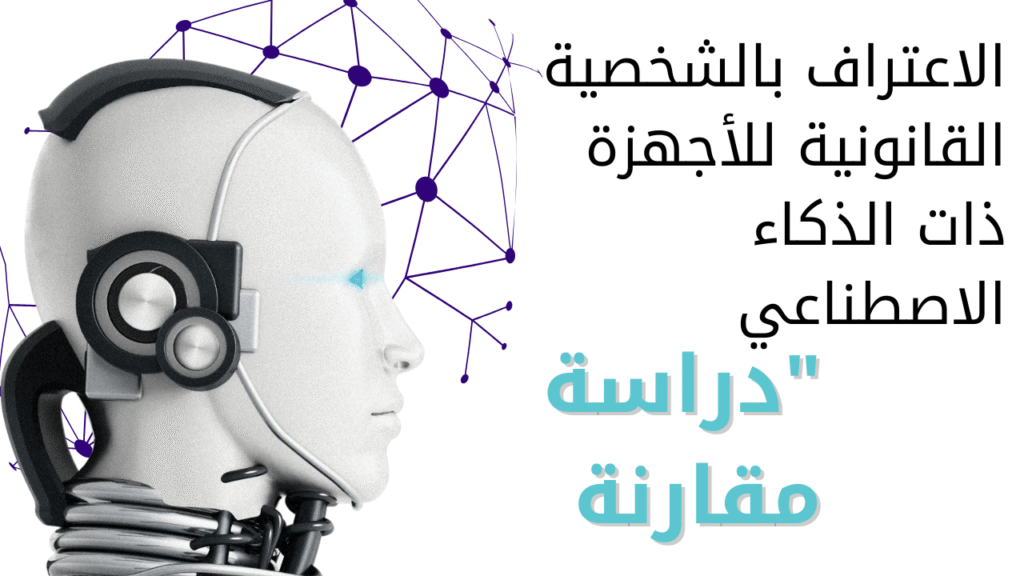الاعتراف بالشخصية القانونية للأجهزة ذات الذكاء الاصطناعي”دراسة مقارنة
الاعتراف بالشخصية القانونية للأجهزة ذات الذكاء الاصطناعي"دراسة مقارنة

الاعتراف بالشخصية القانونية للأجهزة ذات الذكاء الاصطناعي”دراسة مقارنة
The rapid development of artificial intelligence (AI) has challenged traditional legal frameworks across the globe. Among the most debated topics is whether AI devices should be granted some form of legal personality. Recognizing legal personality for AI raises complex questions about liability, rights, governance, and accountability. This comparative study explores how different countries approach the legal recognition of AI devices and examines the potential implications for international law, civil liability, and ethics.
Understanding Legal Personality and Its Significance
Legal personality is the recognition of an entity as capable of holding rights and obligations under the law. Traditionally, legal personality applies to human beings and legal entities such as corporations. Granting AI devices legal personality could theoretically allow them to own property, enter contracts, and be held responsible for their actions. Advocates argue that such recognition may clarify accountability in cases where AI systems act autonomously. Critics, however, contend that AI lacks consciousness, intention, and moral understanding, which are essential for legal subjectivity.
Global Perspectives on AI Legal Personality
Different countries have approached the issue of AI legal recognition in diverse ways. In the European Union, the European Parliament proposed the concept of “electronic persons” in 2017, suggesting that highly autonomous AI could be granted limited legal status to address liability issues. Meanwhile, in the United States, current legal systems rely primarily on existing corporate and tort laws to assign responsibility to developers, manufacturers, or users, without granting AI formal legal personhood. Asian countries, such as Japan and South Korea, have focused on ethical guidelines and regulatory frameworks that emphasize human accountability rather than granting AI legal status.
Implications for Liability and Accountability
Recognizing AI devices as legal persons would significantly impact civil and criminal liability. For instance, autonomous vehicles or AI-driven medical devices could theoretically bear liability for damages they cause. Such recognition could streamline legal processes and reduce disputes over human responsibility. However, enforcing liability for non-human entities presents challenges in practice, including insurance coverage, enforcement mechanisms, and judicial interpretation. Most current systems still assign liability to human actors—developers, operators, or owners—to maintain accountability and legal clarity.
يمكنك قراءة الكتاب هنا مباشرة أو يمكنك تحميله
الاعتراف_بالشخصية_القانونية_للاجهزة_ذات_الذكاء_الاصطناعي_دراسة_مقارنة-1Ethical and Philosophical Considerations
Beyond technical and legal concerns, the question of AI legal personality raises profound ethical and philosophical issues. Can an entity without consciousness or moral understanding truly hold rights or responsibilities? Opponents argue that recognizing AI as a legal subject could undermine human-centered legal principles and dilute accountability. Supporters suggest that limited, context-specific recognition of AI could enhance regulatory clarity, especially in high-risk applications, while still protecting human interests.
Case Studies and Practical Examples
Several real-world scenarios highlight the challenges and potential benefits of AI legal recognition. The European Parliament report cited autonomous vehicles as an example where granting limited legal personality might clarify liability issues. Similarly, AI in financial systems or industrial automation may benefit from having a legal framework that assigns responsibility directly to the AI system under certain conditions. Other jurisdictions, however, continue to rely on traditional human-centered accountability, demonstrating that legal systems can manage AI risks without creating entirely new legal categories.
Challenges in Implementation
Implementing legal personality for AI devices faces several significant challenges. Defining the scope of rights and obligations, establishing enforcement mechanisms, and determining the roles of developers and operators are complex tasks. Additionally, international recognition of AI legal status is complicated by varying national laws and regulatory frameworks, especially for AI devices operating across borders. These challenges highlight why most countries currently prefer hybrid or human-centered liability models.
Recommendations for Policy and Regulation
Comparative analysis suggests that AI legal personality should be applied cautiously and contextually. Limited legal recognition for liability management purposes may provide clarity without granting full rights to non-human entities. Policymakers are encouraged to adopt hybrid frameworks where responsibility is shared among AI devices, developers, and operators. Standardized international guidelines and collaboration will be essential to address cross-border legal challenges and ensure ethical AI deployment.
Conclusion
Recognizing the legal personality of artificial intelligence devices remains a complex issue in modern law. While some countries explore formal recognition, most legal systems continue to rely on human-centered accountability. The evolution of AI technologies, combined with ethical, legal, and technological challenges, requires adaptive, forward-looking legislation. Balancing innovation, accountability, and human-centered principles will be crucial for effectively managing the growing role of AI devices in global society.
SEO Keywords:
AI legal personality, artificial intelligence law, AI liability, AI rights, legal frameworks for AI, AI governance, comparative law AI, AI regulation, AI devices legal status, AI accountability.







